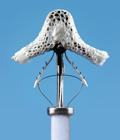
August 13, 2009 – Data published today in the Journal of the American College of Cardiology (JACC) indicates percutaneous valve repair with the MitraClip therapy can reduce acute mitral regurgitation (MR) with sustained freedom from death, surgery or recurrent MR in a substantial proportion of functional and degenerative MR patients.
The published data is from the initial cohort of 107 registry patients treated in the EVEREST (Endovascular Valve Edge-to-Edge REpair STudy) trial, sponsored by Evalve Inc.
Seventy-four percent of patients achieved MR reduction to 2+ or less after receiving the MitraClip device. In 64 percent of these, MR reduction to 1+ was achieved. Additionally, there were no cases of clip embolization or procedural mortality. Kaplan-Meier freedom from surgery was 88.5 percent, 83.2 percent and 76.3 percent at one, two and three years, respectively. Prior to the MitraClip procedure 100 percent of patients were indicated for surgery.
The MitraClip system is the first commercially available treatment option for nonsurgical mitral valve repair for patients suffering from the effects of MR. The MitraClip system is currently in late stage clinical trials in the United States and is available commercially in Europe.
MR is the most common type of heart valve insufficiency in Europe and the United States, and affects millions of people worldwide. Significant MR affects more than eight million people in the U.S. and Europe the majority of which have functional MR. There are more than 600,000 new diagnoses of significant MR each year in Europe and the U.S.; however only 20 percent of these patients undergo surgery each year. Many higher risk surgical patients and nonsurgical patients continue to be affected by the chronic volume overload caused by MR, which requires the heart to work harder, and may ultimately lead to heart failure.
"We have seen procedural success in the majority of patients treated with the MitraClip system," said Ted Feldman, M.D., director of the cardiac catheterization lab at Evanston North Shore Hospital, coprincipal investigator of the EVEREST trial and lead author of the JACC manuscript. "The results we've seen expand the range of options available to patients affected by MR, especially for people who are not good candidates for surgery or who want to avoid the risks of a surgical procedure."
The study population included 107 registry patients with moderate-to-severe (grade 3+) or severe (grade 4+) MR who were candidates for mitral valve surgery. Of these patients, 79 percent had degenerative MR and 21 percent had functional MR. Among patients with functional MR, 74 percent had a history of coronary artery disease and 43 percent had prior bypass surgery.
At baseline, patients either presented with symptoms or when without symptoms, they had compromised left ventricular (LV) function, as defined by an ejection fraction less than 60 percent or a systolic ventricular size greater than 40 mm.
Transthoracic echocardiography was performed at baseline, predischarge, and at one, six, 12 months, and yearly thereafter up to five years. The data was analyzed by an independent echocardiographic core laboratory at the University of California, San Francisco under the direction of Elyse Foster, M.D.
Mitral repair with Evalve's MitraClip device is performed by physicians in the catheterization laboratory. The heart beats normally during the procedure, and therefore does not require a heart-lung bypass machine. In addition to improving blood flow through the heart, the procedure may also relieve symptoms such as fatigue and shortness of breath that often affect patients with significant MR.
For more information: www.evalveinc.com


 January 05, 2026
January 05, 2026 









